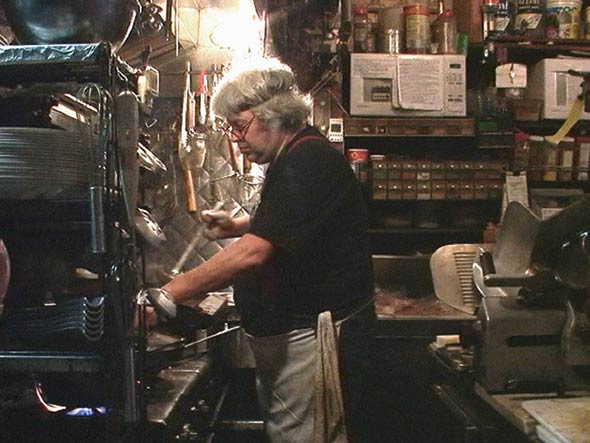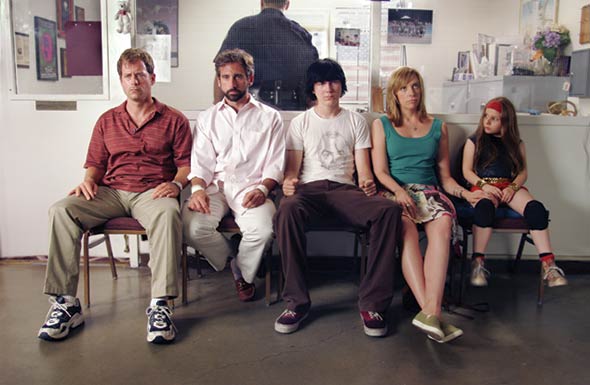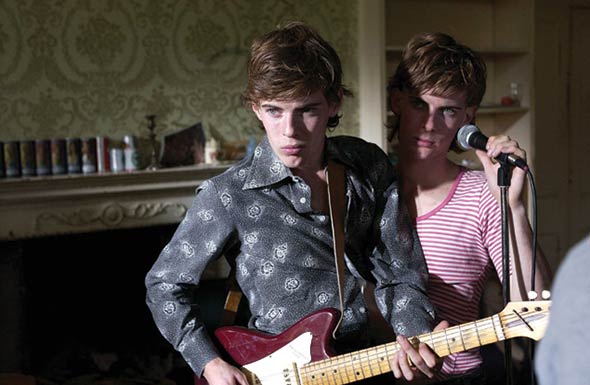
I Like Killing Flies
Directed by Matt Mahurin
The greasy spoon, long a staple of Americana, is paid an affectionate tribute in director Matt Mahurin’s new documentary. The film focuses on Shopsin’s, a Greenwich Village restaurant popular as much for its unusual specialties as for the eatery’s lovably crusty owner and cook, Kenny Shopsin. In I Like Killing Flies, many customers warmly share nostalgic anecdotes about Shopsin’s and about Kenny, who has been known to toss customers out for insults both real and perceived.
But the chef’s occasionally harsh treatment doesn’t keep people away for long. And it’s hardly a surprise, given Kenny’s culinary wizardry. Shopsin’s boasts an amazing variety of dishes – some completely unique to the establishment, and many created at a moment’s notice on little more than a whim. That the food and the proprietor are so distinctive is what makes Shopsin’s irresistible to its longtime diners.
Despite the faithful customers, corporate encroachment into the neighborhood is turning Shopsin’s and eateries like it into an endangered species. Whatever tension the film generates – and it’s not much (this isn’t that kind of documentary) – concerns Kenny’s efforts to look into the future for his business. During this process, Mahurin also focuses his camera on the people surrounding Kenny, including several members of his family who also work at the restaurant. In a city noted for its eccentricity and its characters, Kenny Shopsin qualifies on all counts.
The only sour note here is the film’s wrap-up, which involves the unexpected fate of a principal family member and doesn’t quite follow through, leaving a slightly discordant tone to the overall effort. But otherwise, neither deep nor heavy, I Like Killing Flies goes down easy thanks to Mahurin’s unfettered, “man-at-the-table” approach, and it’s hard not to fall for Kenny and his family’s distinctive capriciousness. MARK BURGER

Little Miss Sunshine
Directed by Jonathan Dayton and Valerie Faris
The timeless fish-out-of-water gag has a million permutations – some funny (Animal House), some moderately amusing (Crocodile Dundee), and some just plain lame (The Pink Panther – the Steve Martin version). But the conceit of pitting a ragtag band of outsiders against the rest of the world in pursuit of an absurd goal (think Ghostbusters or Monty Python and the Holy Grail) often holds the potential for comedic gold. While some new films created with this formula find success (Mean Girls, The 40-Year Old Virgin), most fall by the wayside because they are ultimately too formulaic or present no real depth. So when a new fish-out-of-water film comes along that manages to deliver something new and interesting, a celebration seems called for. Such is the case with Little Miss Sunshine, a bitingly funny independent comedy filled with a classic assortment of oddballs, outcasts and misanthropes all out of their element.
Sheryl (Toni Collette) and Richard (Greg Kinnear) are parents caught in a difficult marriage struggling against all odds to keep things together and get their nerdy-looking daughter to the Little Miss Sunshine beauty pageant. Along the way they must deal with Sheryl’s brother (Steve Carell) who recently botched a suicide attempt, the untimely demise of another family member and an incredibly difficult teenage son. Sounds hysterical, right? In another director’s hands, this would have been a ridiculous soap opera, but with Dayton and Faris at the helm, Little Miss Sunshine is a must-see comedy stacked with big laughs.
The film really connects because of its solidly constructed story and the contrasting moments of humor and pain that each character experiences. Kinnear’s character, for instance, is a second-rate motivational speaker who can’t seem to land a break. We laugh at his overzealousness to encourage his daughter, but wince when his insistence leads her into tragedy.
Calling this a modern-day classic would be too much. The film has occasional lapses – a hasty ending, for one – and some audiences may feel the comedic family conflict hits too close to home. But for those willing to take a chance, Little Miss Sunshine definitely delivers the goods. ANDREW RODGERS

Brothers of the Head
Directed by Keith Fulton and Louis Pepe
Drugs, sex and exploitation carve a path of destruction in Keith Fulton and Louis Pepe’s faux-documentary, Brothers of the Head. Based on the Brian Aldiss novel, the film focuses on the lives of conjoined twins Tom and Barry Howe, who are hand-picked from their vapid and rural Norfolk farm by money-hungry band manager Zak Bedderwick. Anxious to groom the next big pop sensation, he gives the boys a backup band, a manager and a name: the Bang Bang. Through an assemblage of talking-head interviews, live performances, and behind-the-scenes footage, the film follows the twins as they are molded by abusive managers, groupies and two-faced journalists into sweaty, drug-fueled rock stars in the self-destructive vein of Sid Vicious.
Initially, the dense narrative may be disorienting for some as Fulton and Pepe jump between interviews in the present and band footage from the past; however, anyone familiar with Christopher Guest’s mockumentaries will have no problem piecing the story together.
As the Bang Bang starts to gain an audience, the conflicting personalities of Tom and Barry also start to develop. Tom, the more calm and thoughtful of the pair, attempts to have a normal life, while the jealous, pessimistic Barry does everything in his power to destroy them both. In the end what leads to the downfall of the twins and the Bang Bang is not so much the exploitative world of rock and roll, but their inability to lead separate lives. While the subject matter may be uncomfortable for some, the ace performances by newcomers Harry and Luke Treadaway as the title brothers and Clive Langer’s deftly crafted proto-punk soundtrack, are authentic and well worth it. MICHELLE LANZ

